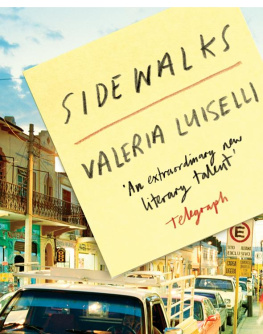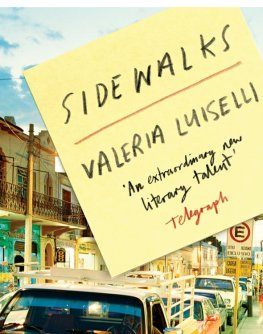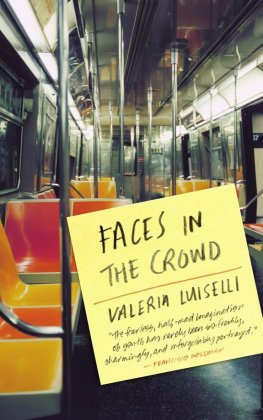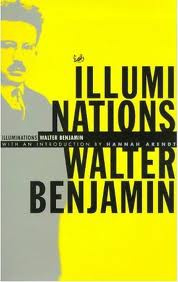Luiselli Valeria - Sidewalks
Here you can read online Luiselli Valeria - Sidewalks full text of the book (entire story) in english for free. Download pdf and epub, get meaning, cover and reviews about this ebook. City: Minneapolis, year: 2014, publisher: Coffee House Press, genre: Detective and thriller. Description of the work, (preface) as well as reviews are available. Best literature library LitArk.com created for fans of good reading and offers a wide selection of genres:
Romance novel
Science fiction
Adventure
Detective
Science
History
Home and family
Prose
Art
Politics
Computer
Non-fiction
Religion
Business
Children
Humor
Choose a favorite category and find really read worthwhile books. Enjoy immersion in the world of imagination, feel the emotions of the characters or learn something new for yourself, make an fascinating discovery.
- Book:Sidewalks
- Author:
- Publisher:Coffee House Press
- Genre:
- Year:2014
- City:Minneapolis
- Rating:3 / 5
- Favourites:Add to favourites
- Your mark:
- 60
- 1
- 2
- 3
- 4
- 5
Sidewalks: summary, description and annotation
We offer to read an annotation, description, summary or preface (depends on what the author of the book "Sidewalks" wrote himself). If you haven't found the necessary information about the book — write in the comments, we will try to find it.
Abstract: Cosmopolitan, vivacious essays in the tradition of Brodskys Watermark and Benjamins The Arcades Project by a celebrated young Mexican author
Sidewalks — read online for free the complete book (whole text) full work
Below is the text of the book, divided by pages. System saving the place of the last page read, allows you to conveniently read the book "Sidewalks" online for free, without having to search again every time where you left off. Put a bookmark, and you can go to the page where you finished reading at any time.
Font size:
Interval:
Bookmark:


First published in the United States by Coffee House Press, 2014
COPYRIGHT Valeria Luiselli, 2010
ENGLISH TRANSLATION Christina MacSweeney, 2013
First published in Spanish as Papeles falsos by Sexto Piso, Mexico, 2010
First published in English by Granta Books, Great Britain, 2013
INTRODUCTION Cees Nooteboom, 2013
ENGLISH TRANSLATION OF INTRODUCTION Laura Watkinson, 2013
COVER DESIGN by Nathan Burton Design Ltd., nathanburtondesign.com
COVER PHOTOGRAPHS Street scene Derek Shapton at Gallery Stock, Post-it note iStockphoto
Passionment from Le chant de la carpe by Ghrasim Luca, copyright 1986.
Reprinted by permission of Jos Corti, Paris.
Coffee House Press books are available to the trade through our primary distributor, Consortium Book Sales & Distribution, cbsd.com or (800) 283-3572.
For personal orders, catalogs, or other information, write to: .
Coffee House Press is a nonprofit literary publishing house. Support from private foundations, corporate giving programs, government programs, and generous individuals helps make the publication of our books possible.
We gratefully acknowledge their support in detail in the back of this book.
Library of Congress Cataloging-in-Publication Data
Luiselli, Valeria, 1983
[Essays. Selections. English]
Sidewalks / Valeria Luiselli ;
translated from the Spanish by Christina MacSweeney.
pages cm
ISBN 978-1-56689-357-2 (e-book)
I. MacSweeney, Christina, translator.
II. Luiselli, Valeria, 1983 Papeles falsos. English.
III. Title.
PQ7298.422.U37P3613 2014
864.7DC23
2013035162
To lvaro
To Maia
Contents
by Cees Nooteboom
SIDEWALKS
Sometimes unexpected things happen that fit together so perfectly it seems as though the ultimate computer that controls and watches over everything does exist after all. A couple of years ago, when I was in Bogot, I received an e-mail from Karaat, a Dutch publishing house I did not know, asking me to write a foreword for a book by a young Mexican writer I had never heard of. I asked my Colombian host, the poet Pedro Alejo Gmez, who was once the Colombian ambassador to the Netherlands and now runs the Poetry House in Bogot, if he knew her, but no, he had never heard of her either. Now, it is not the case that books by authors and poets from one Latin American country are sold or discussed in all the other countries on that continentfar from it. Which is why it came as a double surprise when that same day, in a large bookstore in Bogot, I spotted her book: a slim, crimson edition without any adornment, just the laconic title, Papeles falsos , and her name, Valeria Luiselli.
In the days that followed, I traveled around Colombia, to Popayn and Leticia and Cartagena de Indias, with the book in my luggage, and right from the start I realized that I had treated myself to a surprise present.
There is no place better for reading than a hotel room. In tropical Leticia, on the Amazon, the light was yellowish and the room a cavernous yet stifling brick chamber with a groaning ceiling fan, but with the book I was on familiar ground, in the cemetery of Venice, beside the grave of Joseph Brodsky, which I had visited myself years ago for my book Tumbas . And perhaps that is the explanation: when you have written about something yourself, you are better able to absorb what another person writes about the same subject. But even though I had felt tremendous respect for Brodsky since once hearing him read at Poetry International in Rotterdam, Luisellis Brodsky was different from mine; she clearly enjoyed a far deeper affinity with him. At the cemetery of San Michele, I had gone in search of the dead, but she was looking for Brodsky. It was for him that she had gone to Veniceand that is a different kind of journey.
Luiselli may have been young (when she wrote these essays she was in her early twenties), but here was someone who could write in an extremely personal way about her quest to find an admired author, and about her stay in the city that Brodsky himself had written about so magnificently. But, once again, her Venice is a different city from his. She arrives feeling ill, finds a room in a convent, gets locked out, and contemplates sleeping on a bench. A friend helps her out and she is soon registered as a resident of the comune of Venice, with local health insurance. This may seem no more than a curious detail, but there is more to it than that. Random things happen to some people; openness is sometimes rewarded with what Luiselli herself refers to as papeles falsos, false papers, particularly when it is the kind of openness with which she views and describes the world. When you undertake a journey with Luiselli, whether in Mexico, flying above the ocean, or in New York, you are traveling with a way of seeing and thinking that belongs to another person; it is sui generis, and you are made to think in a way that is not automatically your own. You find yourself musing about the excess of identity that a face takes on over the course of time, about the disappointment of long-awaited first encounters with the dead and the living, about what words really are and if their meanings can win out over their letters, and about the motionlessness of maps and the tautological horror of those screens on transatlantic flights, where you can watch the icon of the plane you are sitting inside moving, one millimeter at a time, over the blue emptiness of an image of the ocean.
The tone of her writing is that of the flneur and the philosopher, as the rhythm of her walking (and cyclingthere is an entire passage about being a flneur on a bicycle, and that in Mexico City of all places!) accompanies her thoughts about architecture and what it does to people, and about empty spaces in the city; this is thinking with a background of asphalt and sidewalk.
The influence of Europeans such as Benjamin, Kracauer, and Baudelaire is never denied, and yet all of her vivid musings retain a Mexican accent, and her openness results in the most remarkable encounters: elderly ladies, security guards, doormen, a Chinese neighbor sitting at his computer, whom she only ever looks at through her window, never exchanging a word with him. This is an idiosyncratic and solitary world that never loses its connection with the world outside.
For the urban nomad, outside has become inside, and vice versa.
What is actually going on in this book? What makes it so enchanting? Because it is, even though that word does not entirely seem to fit with what is at times a high degree of abstraction, with pertinent statements that make the reader pause after a few words and briefly tread water before rereading: To locate the grave, the definitive inscription were looking for, its necessary to examine the veining of the marble closely.
It must be the combination of candor and intelligence, each of which, in its own way, results in a particular method of looking and writing. You need to be good at looking in order to know where you are not, because only then do you know where you actually are. You must coolly convey your discovery of the absurd detail and master the art of hilarious understatement. You also have to be able to hear that the name Mexican Commission on Limits will turn your story about the Mexican Map Librarywhich is intriguing enough in itself even without the addition of the Commissioninto a strange adventure for the reader. And then you have to write about it in such a way that the reader also sees everything: both the long, narrow corridors where maps hang like perennially damp sheets and the photograph of the eight members of the Commission, who resemble the eight doctors in Rembrandts The Anatomy Lesson of Dr. Nicolaes Tulp. And this must be done with a simple flick of the wrist, suddenly transporting the painter from Leiden and Amsterdam into a Mexican map room with a maneuver that shows us, the readers, precisely what the writer means.
Next pageFont size:
Interval:
Bookmark:
Similar books «Sidewalks»
Look at similar books to Sidewalks. We have selected literature similar in name and meaning in the hope of providing readers with more options to find new, interesting, not yet read works.
Discussion, reviews of the book Sidewalks and just readers' own opinions. Leave your comments, write what you think about the work, its meaning or the main characters. Specify what exactly you liked and what you didn't like, and why you think so.






